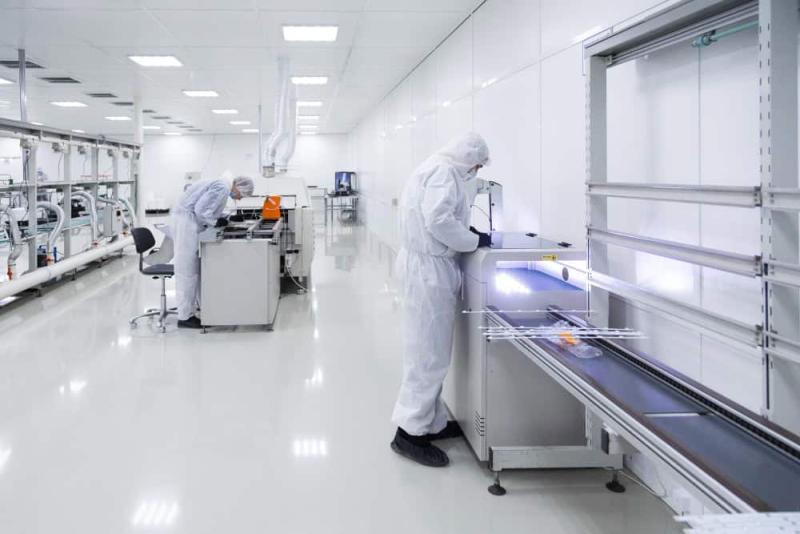Role of Cleanroom Validation in Pharmaceuticals

Cleanroom validation is a critical process in pharmaceutical and other highly regulated industries that ensures controlled environments meet strict standards for air quality, cleanliness, and contamination control. These specialized rooms, known as cleanrooms, are designed to limit particulates, microbes, and other contaminants to create a safe and sterile environment for manufacturing, testing, and packaging sensitive products, like medicines, medical devices, and other healthcare products.
What is Cleanroom Validation, and How Does It Work?
The cleanroom validation is the comprehensive assessment of cleanroom systems, equipment, and processes to verify that they comply with the required regulatory standards. This validation involves multiple stages:
- Design Qualification (DQ): Ensures that the cleanroom is designed to meet operational and regulatory standards.
- Installation Qualification (IQ): Verifies that all equipment and systems are installed correctly, according to specifications.
- Operational Qualification (OQ): Confirms that the cleanroom functions as intended under specific conditions.
- Performance Qualification (PQ): Assesses the cleanroom’s performance during normal, controlled operations.
Each stage is essential to ensure that the cleanroom consistently maintains cleanliness levels, temperature, humidity, and pressure within specified limits. Validating a cleanroom often includes testing for airborne particles, microbial contamination, and airflow rates to meet ISO and GMP standards.
Key Benefits of Cleanroom Validation
- Improved Product Quality and Safety: Cleanroom validation is essential for ensuring product safety and efficacy. Pharmaceuticals and medical devices are particularly sensitive to contamination. By validating cleanrooms, companies can prevent particulate or microbial contamination that could compromise product quality, ultimately protecting end-users and patients.
- Regulatory Compliance: Regulatory bodies, such as the FDA (Food and Drug Administration) and EMA (European Medicines Agency), enforce strict guidelines for pharmaceutical and healthcare product manufacturing. Cleanroom validation helps companies maintain compliance with standards like ISO 14644 and GMP (Good Manufacturing Practice) requirements, avoiding potential legal issues and fines.
- Enhanced Consistency and Reliability: A validated cleanroom is a reliable environment where operations can be performed with reduced risk of variability. This ensures that every batch of a product meets the same stringent quality standards, enhancing trust and reliability across manufacturing processes.
- Reduced Risk of Product Recalls: Product recalls are costly, time-consuming, and damaging to a brand’s reputation. By validating cleanrooms, companies reduce the likelihood of contamination incidents that could lead to recalls, helping to protect the company's financial health and brand image.
- Operational Efficiency: Regular validation ensures that all equipment and environmental controls are functioning correctly. This process prevents unexpected shutdowns or equipment failures, leading to improved operational efficiency and reduced downtime.
- Cost Savings: While cleanroom validation is an investment, it yields significant cost savings in the long term by preventing contamination-related production issues. The reduction in recalls, reworks, and production stoppages translates to a more streamlined and cost-effective operation.
- Customer Confidence and Market Access: For companies to export products or supply to highly regulated markets, compliance with international cleanroom standards is often a prerequisite. Validated cleanrooms enhance customer confidence, proving that the products meet high safety and quality standards, which opens doors to new markets and strengthens customer relationships.
- Supporting Innovation and Advanced Research: A controlled and validated cleanroom environment allows researchers and developers to push boundaries in drug formulation and product development. When companies know their cleanrooms meet stringent standards, they can confidently invest in innovative processes, knowing that the environment is optimized to support accuracy and safety in research.
Final thought
Cleanroom validation in pharmaceuticals is not merely a regulatory requirement but a strategic approach to ensuring product quality, safety, and operational efficiency.
By investing in cleanroom validation, companies can protect the integrity of their products, reduce contamination risks, improve customer confidence, and maintain compliance with international standards, ultimately driving business growth and supporting healthcare innovation. Contact PDVD Consultancy today for your pharmaceutical Planning, Designing, Validation and Documentation services in India.
Post Your Ad Here
